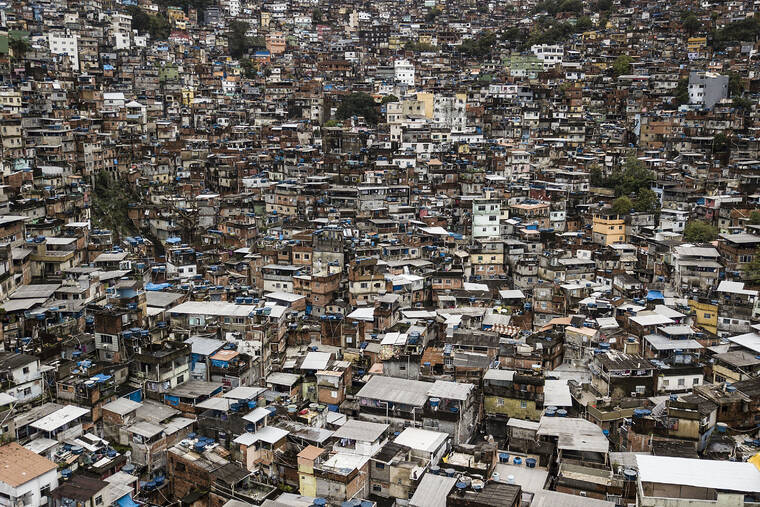Brazil changing name of ‘subnormal’ neighborhoods
RIO DE JANEIRO— After decades of delay and pressure, Brazil announced Tuesday that it will henceforth use “favelas and urban communities” to categorize thousands of poor, urban neighborhoods, instead of the previous term “subnormal agglomerates” that was widely viewed as stigmatizing.
Starting in the 1990s, the national statistics and geography institute, known by its Portuguese acronym IBGE, began using “subnormal agglomerates” to describe places with irregular occupation and deficient public services.
The umbrella term included not just favelas — most commonly associated with dense, hillside neighborhoods in Rio de Janeiro — but also a slew of other terms employed across Brazil, like grottoes, lowlands, stilted houses and more, where millions reside.
The name change announced in a statement follows a process of reflection that began in the 2000s, and IBGE held more than 20 internal meetings and then several more with a consultation group of outside experts, according to its geography coordinator, Cayo Franco.
The concept of “subnormality” referred to people’s living conditions, but “many times it was understood as the condition of the people themselves,” Franco told The Associated Press in a video call. It was also too vague to represent reality.
Further, “agglomeration” transmitted an image of people piled atop one another, said Theresa Williamson, executive director of a favela advocacy group, Catalytic Communities. Many of these neighborhoods aren’t recent; rather, they are consolidated, having been built up over generations with individual or collective investment, and in spite of chronic state negligence in providing sanitation, infrastructure, education and other services.
“When you have a term that’s pejorative, labeling such a huge portion of the country, it can only be counterproductive,” said Williamson. “You need terms that are more nuanced when you’re talking about such large sectors of society, especially that you need to be able to embrace and engage in constructive ways so that you (the government) can improve them, rather than sort of deny them any value.”
Rio state lawmaker Renata Souza, who was born and raised in the bayside Mare favela, one of the city’s most populous, said her doctorate in communications and culture taught her the importance of words, and she celebrated IBGE’s move.
“The word ‘subnormal’ is something that has always really affected me, because it gives the idea of an aberration, of a non-place,” she told the AP on the phone. “Nomenclature is used to consolidate prejudices, discriminations.”
Souza volunteered to survey Mare residents for the IBGE’s census in 2000.
“Having to work with that word was horrible for me,” she said.
In the process of conducting its next census, a decade later, expanding deficient mapping of the historically neglected areas took priority over considering a change to the problematic name, IBGE’s Franco said.
“So that was left for later. But I think a moment of institutional and societal maturity has been reached, in which there is sizeable representation of those territories, residents’ associations and groups that even conduct research and produce statistics,” he said.
He noted the recent creation of a secretariat for peripheries in lefist President Luiz Inácio Lula da Silva’s cities ministry.
According to the institute’s preliminary data from the 2022 census that the AP reviewed early last year, the number of people living in neighborhoods at the time called “subnormal agglomerates” jumped 40% since the 2010 census to 16 million people.
Franco said that the institute has identified more such areas with the help of city authorities and civil society groups; their total population will be incorporated into 2022 census data and released in the second half of this year.
The change in name won’t affect historic census data and, as before, the IBGE will cease to consider areas “favelas and urban communties” once most residents gain legal title to properties or all essential services are available.
The term “favela” draws its origins from the 19th century, when soldiers and former slaves who had fought in the Canudos War in northeast Brazil occupied a hillside in Rio, the capital at the time, to pressure the government to fulfill its promise to provide housing. The veterans named the informal settlement Favela Hill after a highly resilient flowering plant found in the northeast. Today, the downtown neighborhood is known as Providencia.
Souza, the lawmaker, said the term underscores residents’ struggle and resilience.
“It’s a plant that grows in the middle of the Brazilian savannah, and survives without water and with very high sun exposure,” she said. “It is very important that we take back this word.”
“Favela” is used widely in Rio, but not elsewhere in Brazil, so IBGE sought to append another catch-all term for the category. At a meeting last September with civil society groups in the capital, Brasilia, the institute proposed adoption of “favelas and popular settlements” and, following discussions, that was discarded in favor of “favelas and popular territories” or “favelas and urban communities.” IBGE ultimately opted for the latter.
“We have had some back and forth, but it was positive. It will be positive for IBGE and for Brazilian society that we have made this change,” Franco said. “It better represents what we want to map and better represents what people should understand from the data.”

